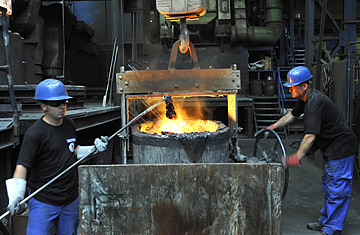
German industrial orders saw their second consecutive strong month-on-month rise in June.
It's not exactly Christmas come early, but France and Germany did get a nice surprise on Thursday with the news that they have lifted themselves out of recession with Q2 growth of 0.3% each. Meanwhile, the 16 intertwined economies of the euro zone have shrunk less than expected during the second quarter of 2009. But, experts warn, don't go saying that Europe's worst economic crisis in half a century is over just yet.
"We're pleasantly surprised, and didn't expect this before the third quarter," says Gilles Moec, a European economist for Deutsche Bank in London. "But the improvement is rather thinly spread, and not necessarily sustainable. A lot will depend on whether the positive activity in exports and consumer spending continues, which may prove difficult."
Still, after nearly a year of relentlessly grim economic news, the reaction to Thursday's revelation in Germany and France — Europe's first- and second-largest economies respectively — tended to echo Moec's upbeat bottom line that the two countries had "extricated themselves from recession, which can only be good." Stock markets sure thought so: London's FTSE 100 index rose 1.3% on the news, and Wall Street followed indices elsewhere in Europe with more modest gains.
"The data is very surprising — after four negative quarters, France is finally coming out of the red," said French Economy Minister Christine Lagarde on RTL radio. And from Berlin, Germany's Economy Minister Karl-Theodor zu Guttenberg issued a statement similarly applauding the unexpected growth statistics. Still, he cautioned, they are "no grounds for euphoria, because we're still a long way from seeing the economy back at the level that it was at last year."
True, Germany's 0.3% second-quarter spurt is a modest one. But it's a vast improvement on the economic contraction of 3.1% that Germany suffered in the first quarter of 2009 — its fourth straight negative quarter. France's identical 0.3% advance contrasts its 2008 first-quarter shrinkage of 1.3%. Both economies benefited from better than expected consumer spending and higher exports led primarily by car sales — and in France's case, airplanes as well.
The news elsewhere across the 16 nations who use the euro was mixed, with overall activity declining by 0.1%. But even that was better than the 0.5% drop economists had expected, with Greece and Portugal joining France and Germany by posting gains of 0.3% each. Meanwhile, Italy's economy shrank by 0.5% and the Netherlands' dropped 0.9%, while Austria and Belgium both contracted by 0.4%. Previously, the U.K. — which does not belong to the euro zone — reported that its expected 0.5% second-quarter decline had in fact been 0.8%.
So what to make of all that? The U.K. aside, better than anticipated activity holds the hope that Europe may be following the U.S. in seeming to climb out of its deep economic stupor faster than expected — however gingerly. The challenge now is to sustain that improvement. Initial data released state statistics agencies indicates both French and German export boosts primarily benefited from renewed activity in Asia, which itself is at risk of waning.
France and Germany's Q2 economic growth was also fueled by increased business investment financed in large part by governmental stimulus plans introduced late last year: $37 billion for France and $67 billion for Germany. But the economic engines revved up by those funds could still stall anew if organic activity doesn't pick up the slack. And that's not guaranteed to happen. Consumer spending also contributed to growth in France and Germany, thanks to falling prices. Those prices, though, will soon stabilize and start rising, which may act as a brake on growth in the near future. So, too could the widespread layoff plans currently being unrolled by companies that have avoided downsizing thus far — a move that often provokes belt-tightening across an entire economy.
"The second-quarter data gives reasons for hope, but it also resulted from some exceptional factors that will be increasingly less influential from now on," Moec says. "The outlook, therefore, is one of cautious optimism."
Even if the big euro-zone motors of France and Germany manage to continue growing along with smaller economies like Greece and Portugal, Moec warns that broader European recovery will be a sluggish affair. Countries like the U.K., Spain, and Ireland — which each suffer from some combination of excessive household debt and structural over-reliance on real estate and financial industries — risk taking far longer to remedy their economic ailments, which would slow a regional rebound. Ditto Italy, whose consistent under-performance is rooted in competitive weaknesses that couldn't be cured even during good times.
So while the latest good news was a pleasant surprise, there's a lot more work to do. And recognizing that would be the best gift Europe could give itself.
